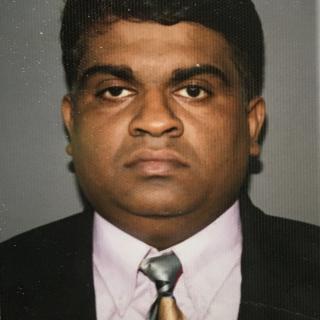Nadisha Ranmuthu was born in the city of Kalutara, south of the Sri Lankan capital Colombo, on 30 June 1966. After finishing school, Nadisha studied computer programming and systems analysis, earning several qualifications between 1986 and 1989, including from the University of Colombo and the City & Guilds of London Institute. His computer skills saw him take on several IT roles in Sri Lanka, as well as a two-year stint as a software manager in Bahrain (1990–1992). Nadisha had been hooked on computers since his early teens, eventually setting up a small computer and electronics company with his brother. But they were not his only passion: he also loved radio.
Nadisha was a devoted ham radio operator, with his own station and call sign 4S7NR. He obtained his amateur radio licence in 1988 and became an active member of the Radio Society of Sri Lanka, serving as its editor and first webmaster. He even married a fellow ham radio operator: Priyadarshi, call sign 4S6CR. And it was as a radio operator that he joined the ICRC in Colombo in 1992.
Over the next decade, Nadisha’s cheerful, comforting voice became familiar to staff from Jaffna to Trincomalee, and Mallavi to Batticaloa, accompanying them on countless field trips during what was a particularly brutal period of the Sri Lankan Civil War. He built “bridges across space”, transmitting his humanity and good humour to colleagues far away. As they later recalled: “You were always with us on the airwaves when we were travelling in our vehicle, sometimes in the most remote places, when you were the only reassuring link with ‘home’.”
He was also a gifted technician, capable of setting up computers, radio equipment and antennas. In April 2003 Nadisha successfully applied for a support assignment in Iraq to help install and improve the delegation’s telecommunications system. This was shortly after the start of the 2003–2011 Iraq War. The assignment went well, and the night before starting his journey home to his family in Sri Lanka, Nadisha prepared a typical Sri Lankan meal. It was his way of saying goodbye to his newfound friends and colleagues at the ICRC office in Hilla, central Iraq. Among his many talents – photography being another – he was an accomplished cook.
The following day, 22 July 2003, Nadisha was killed in an attack on his vehicle just north of Hilla. He was 37 and the father of a three-year-old girl. His Iraqi driver, Mazen Hamed Rashid, was seriously wounded.
At Nadisha’s memorial ceremony in Geneva a week later, hundreds of colleagues paid tribute to an extraordinary man whose optimism, energy and capacity to communicate across physical and cultural boundaries left an indelible impression on those who met him – either in person or over the airwaves.
